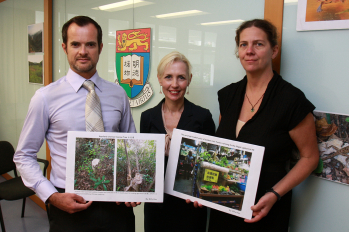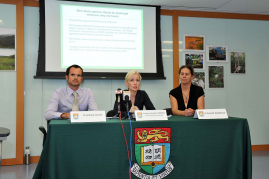Media
HKU study finds Hong Kong Laws
inadequate to protect threatened animal and plant species
17 Sep 2013
A new report by the Faculty of Law at the University of Hong Kong (HKU) has concluded that while existing legislation has played a key role in eliminating most hunting of native terrestrial animals, and limited collection of valuable plant species, several Ordinances are in urgent need of updating. “A Review of Hong Kong’s Wild Animal and Plant Protection Laws”, undertaken by a multidisciplinary team led by animal-law expert Associate Professor Amanda Whitfort, reviewed the effectiveness of the five key ordinances* in protecting wild native species in Hong Kong.
Hong Kong has more species of birds, butterflies, mammals, freshwater fish amphibians and reptiles than the United Kingdom, despite the fact that the area of the latter is over 200 times greater than the SAR. Closer to home, China is 9,000 times larger than Hong Kong, yet fully one third of Chinese bird species occur here. Unfortunately, despite this disproportionate biological richness, current legislation is insufficient to protect the SAR’s natural heritage, and some endemic species found nowhere else on Earth lack any protection under current laws.
Professor Whitfort stated: “While Hong Kong has had some form of legislation to protect biodiversity in place for almost 150 years, it needs updating to be effective today. We analysed all the legislation intended to protect aquatic and terrestrial plants and animals in Hong Kong with the intention of making recommendations to the HKSAR Government for law reform. We also hoped to enhance understanding of that legislation among conservation professionals, those who have to enforce the relevant ordinances, and the general public. There was clear consensus among the experts who assisted in our study of the pressing need to update the laws intended to protect native species in Hong Kong”.
“In past decades, the main threats to biodiversity in Hong Kong were the hunting of birds and mammals, and collection of rare plants such as orchids” explained Dr. Andrew Cornish, an independent conservation professional who was part of the review team. “Existing legislation had therefore focused on reducing those threats by protecting species that were hunted and collected. Due to the enforcement by the Agriculture, Fisheries and Conservation Department, these have largely been successful although, certain species with high commercial value, notably Incense trees and the critically-endangered Golden-coin turtle, are sadly still being poached. Also, because the seas were thought to be endlessly bountiful, fishes and invertebrates were specifically excluded from protection. Fast-forward to 2013, and the main threats to marine biodiversity are from commercial fishing and rampant coastal development, so there is an urgent imperative to update the laws relating to protection of marine species. Furthermore, four species of freshwater fish have already become extinct in Hong Kong, and there are concerns for twenty more, demonstrating that some species of freshwater fishes need protection too.”
Professor Whitfort drew attention to the large number of invasive alien (or non-native) species that have become established in Hong Kong, she said: “Legislation is needed to comprehensively identify and control those species of invaders which are causing significant harm to native wildlife. This is, in fact, one of our obligations under the UN Convention on Biological Diversity that was extended to Hong Kong in 2011”.
In total, the Review makes 15 recommendations for legislative amendments; of particular importance are:
• The creation of a “List of Hong Kong Species of Conservation Concern” which includes all types of threatened animals and plants (including freshwater fishes, and marine fishes and invertebrates) and is periodically updated to inform lists of protected species under all relevant Ordinances. This recommendation would result in a ‘Red List’ of threatened species in Hong Kong. Indeed, the SAR has a duty to develop its own Red List** under the international Convention on Biological Diversity.
• Improved measures to manage invasive alien species, including legislative amendments to the Wild Animals Protection and Forest and Countryside Ordinances to allow for the process of identifying terrestrial and freshwater “unwanted organisms” (a legal term relating to invasive alien species which may cause significant harm to natural and physical resources or human health), and for the creation of a public list of such unwanted organisms.
• Improved methods to determine the impacts of development on native species under the Environmental Impact Assessment Ordinance, primarily by requiring EIAs to assess the impacts of developments on all Hong Kong ‘Red List’ species.
The Review is intended to contribute to the process of formulating Hong Kong’s first Biodiversity Strategy and Action Plan, required by the Convention on Biological Biodiversity, which is currently being led by the Environment Bureau. “Our recommendations seek to secure the long-term conservation of local biodiversity”, concluded Professor Whitfort, “but progressive policies and the allocation of sufficient resources for legislative enforcement will also be necessary if the threatened species and the ecosystems that sustain them are to be adequately protected”.
The Review was supported by Hong Kong University’s Knowledge Exchange Fund which is provided by the University Grants Committee.
* The five Ordinances reviewed were the Wild Animals Protection (Cap. 170), Forests and Countryside (Cap. 96), Fisheries Protection (Cap. 171), Country Parks (Cap. 208) and Marine Parks (Cap. 476) Ordinances.
** The IUCN Red List of Threatened Species is internationally accepted as the most comprehensive, objective approach for assessing the global conservation status of animal and plant species. The criteria for identifying Hong Kong Species of Conservation Concern would based on the IUCN Red List criteria, but adapted to local circumstances (notably the small size of the SAR).
For the full report, please visit: http://www.cpao.hku.hk/media/130917lawreview.pdf .
For media enquiries, please contact Professor Amanda S. Whitfort (Tel: 3917 2976/Email: whitfort@hku.hk) or Ms Melanie Wan, Senior Manager (Media) (Tel: 2859 2600/Email: melwkwan@hku.hk ), Communications & Public Affairs Office, HKU.
Incense trees have been widely chopped and collected in HK in recent years for making agarwood, which is a highly priced traditional Chinese medicine (Photo by Dr. Billy C.H. Hau)





